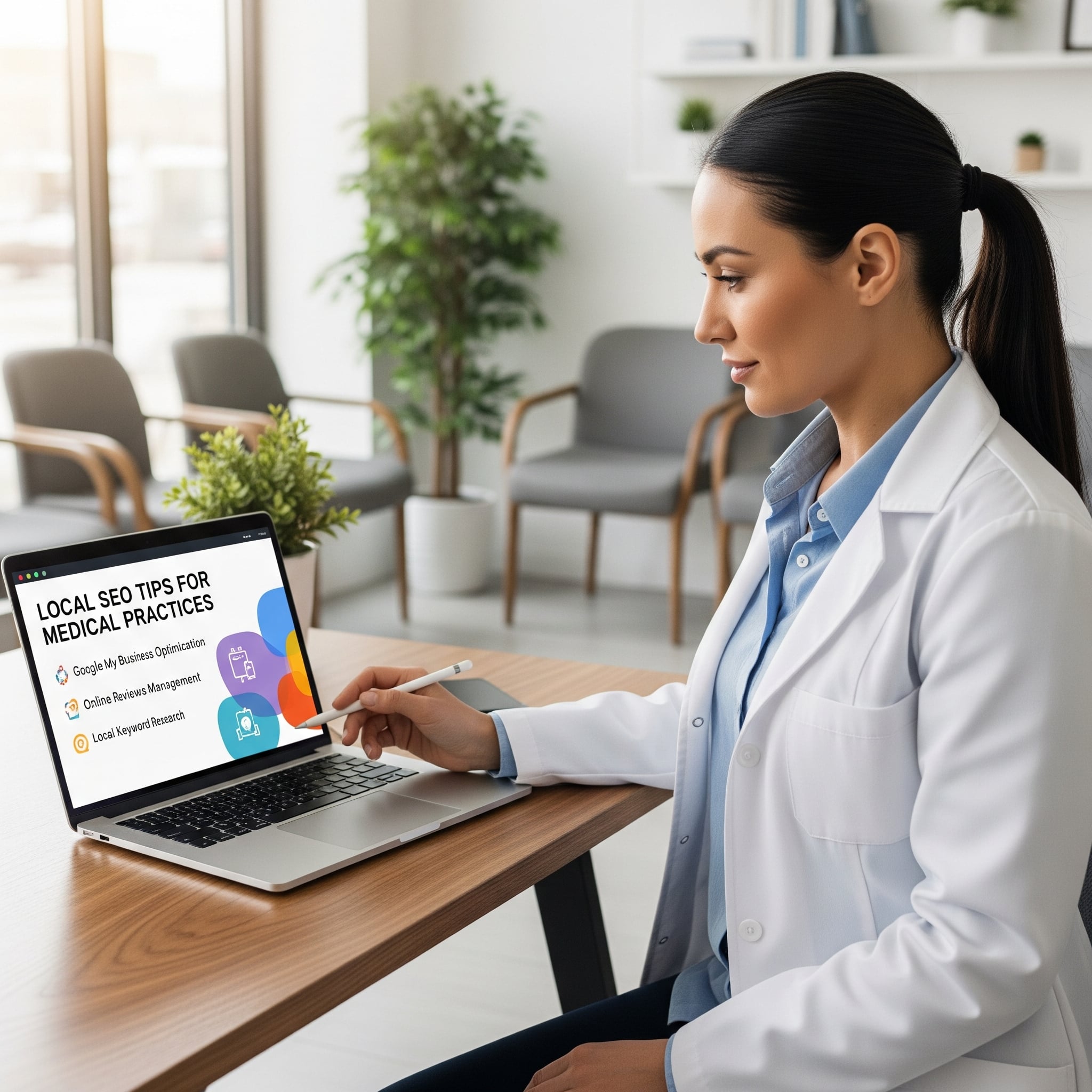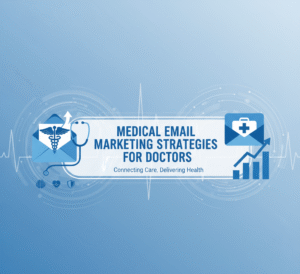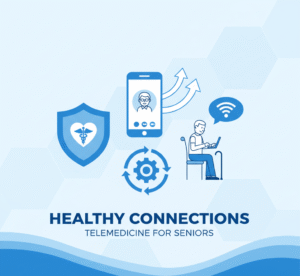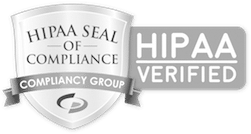“Improve your clinic’s online visibility and attract more patients with this comprehensive guide on key Local SEO Tips for Medical Practices to boost your presence.”
The digital age has transformed how patients find healthcare providers. Gone are the days of flipping through the Yellow Pages or relying solely on a friend’s recommendation. Today, when someone in your community needs a doctor, their first move is almost always the same: they pull out their phone and search online. They’re typing in queries like “best pediatrician near me,” “cardiologist in [Your City],” or “clinic open on Saturday.” If your medical practice doesn’t appear prominently in those search results, you’re invisible to a massive pool of potential patients.
This is where local Search Engine Optimization (SEO) becomes not just a marketing buzzword but a critical component of a thriving modern medical practice. Local SEO optimizes your online presence to attract more patients from relevant local searches. Think of it as the digital equivalent of having a bright, welcoming sign on your clinic’s door, but one that’s visible to everyone in your service area who’s actively looking for the care you provide.
Many clinic owners and practice managers feel overwhelmed by digital marketing. It can seem complex, time-consuming, and full of technical jargon. However, the foundation of a powerful local SEO strategy is surprisingly straightforward and accessible. It begins with one of the most powerful free tools available to any local business: your Google Business Profile (GBP).
This article will serve as your comprehensive, step-by-step guide to mastering your clinic’s local SEO, focusing on optimizing your Google Business Profile. We’ll break down the essential elements you must have in place, from ensuring your basic information is accurate to leveraging patient reviews and posting regular updates. The advice you’ll find here is practical, actionable, and designed for immediate implementation.
By the end of this guide, you will have a clear roadmap to enhance your online visibility, build trust with prospective patients before they even walk through your door, and ultimately grow your practice. For those who wish to take digital marketing to the next level, we’ll introduce a partner who can help you navigate this landscape with expertise and a proven track record of success in the healthcare industry.
Your clinic’s journey to digital prominence starts now. Let’s ensure that the next time a local patient searches for a healthcare provider, your practice is the first one they find.
What is Local SEO and Why is it Non-Negotiable for Your Clinic?
Before we dive into the “how,” let’s take a moment to understand the “what” and the “why.” Local SEO is a specialized branch of search engine optimization that focuses on improving your visibility in local search results. When a person includes a location in their search query (e.g., “urgent care in Brooklyn”) or when Google infers a local intent from the search itself (e.g., “best dermatologist”), the search engine’s algorithm prioritizes results that are geographically relevant and reputable.
The most prominent feature of these local search results is the “Local Pack” or “Map Pack.” This box appears at the top of the search results page, displaying a map and a list of three businesses. Securing a spot in this coveted real estate can dramatically increase your clinic’s visibility and patient inquiries. In fact, studies have shown that businesses featured in the local map pack receive a significantly higher number of clicks, calls, and direction requests than those listed further down the page.
But why is this so critical for medical practices in particular? Consider these points:
- Healthcare is Inherently Local: Patients almost always look for healthcare providers within a specific geographic area. They need a doctor they can conveniently visit, especially for regular check-ups, ongoing treatments, or when they feel unwell. Proximity and convenience are major decision-making factors.
- Urgency Drives Local Searches: Many health-related searches are driven by an immediate need. A parent with a sick child, an individual with a sudden injury, or someone experiencing concerning symptoms will search for immediate, local solutions. If your clinic isn’t visible in these moments of need, you’re missing out on a critical opportunity to serve your community.
- Trust Begins Online: Trust is paramount in the healthcare field. Before patients entrust you with their well-being, they want to be confident in your credibility and expertise. A well-optimized online presence, complete with accurate information, professional photos, and positive patient reviews, is often the first step in building that trust. A sparse or inaccurate online profile, on the other hand, can be a significant red flag.
- The Digital Shift in Patient Behavior: Modern patients are proactive, informed consumers. They research their symptoms, investigate treatment options, and vet potential healthcare providers online. According to recent data, most patients now use online reviews as a key part of their decision-making when choosing a new doctor. Your online reputation is, in many ways, your new word-of-mouth referral system.
- Competitive Advantage: In many areas, the healthcare landscape is crowded. Several other clinics or practices may offer similar services. A strong local SEO strategy is a powerful way to differentiate your practice, highlight your unique specialties, and stand out.
In short, local SEO is not just about being found; it’s about being chosen. The bridge connects local patients actively seeking care with your practice. By investing time and effort into your local SEO, you’re not just playing a marketing game but making it easier for people in your community to access the quality healthcare you provide. Ignoring local SEO is akin to having an unlisted phone number in an era when everyone uses a directory. You may offer the best care in town, but if patients can’t find you, it won’t matter.
The Ultimate Google Business Profile Checklist for Clinics
Your Google Business Profile (GBP) is the cornerstone of your local SEO efforts. It’s a free and powerful tool that allows you to manage how your practice appears on Google Search and Maps. A complete, accurate, and active GBP listing not only provides potential patients with the information they need but also signals to Google that your practice is a legitimate and relevant entity, which can significantly boost your local search ranking.
Think of your GBP as a digital storefront. You want it to be clean, informative, and welcoming. Let’s walk through the essential steps to optimize your profile, turning it into a patient-attracting powerhouse.
1. Claim and Verify Your Profile
The very first step is to ensure you have ownership of your profile.
- How to Do It: Go to google.com/business and search for your clinic’s name and address. If a profile already exists, you’ll see an option to claim it. If not, you can create a new one from scratch.
- Verification: Google must confirm that your clinic is where you say it is. This is typically done by sending a postcard with a verification code to your physical address. Sometimes, you can verify via phone or email.
- Why It’s Crucial: Without verifying your profile, you won’t have complete control over the information displayed, respond to reviews, or access valuable insights. It’s the key that unlocks all of your GBP’s features.
2. Ensure Absolute NAP Consistency
NAP stands for Name, Address, and Phone Number. This is the bedrock of your local SEO foundation.
- What It Means: The way you list your clinic’s name, address, and phone number on your GBP should be precisely the same as how it’s listed on your website and everywhere else on the internet (like Yelp, Healthgrades, and other directories).
- Be Meticulous: This means no variations. If your address is “123 Health Street, Suite 4B,” don’t list it as “123 Health St., #4B” somewhere else. If your clinic’s name is “Oakwood Family Clinic,” don’t shorten it to “Oakwood Clinic” on another platform.
- Why It Matters: Inconsistent NAP information confuses search engines and erodes their trust in your business’s data. Conversely, consistency reinforces your location and legitimacy, a positive ranking signal.
3. Choose the Right Categories
Categories tell Google what your clinic does. This is a critical step for ensuring you show up in relevant searches.
- Primary Category: You’ll choose one primary category. This should be the most accurate and specific descriptor of your practice. For example, instead of just “Clinic,” select “Pediatrician,” “Cardiologist,” or “Urgent Care Clinic.”
- Secondary Categories: You can (and should) add several secondary categories. Think of all the services you provide. A family practice might add categories like “Family Practice Physician,” “Medical Clinic,” and “Physical Examination Center.”
- Pro Tip: Look at the categories your top-ranking local competitors are using. This can give you some good ideas, but always ensure your chosen categories genuinely represent your services.
4. Craft a Compelling Business Description
Your business description is your opportunity to tell potential patients who you are and why they should choose you.
- Be Clear and Concise: You have 750 characters, so make them count. The first 250 are the most important, as they are what users will see without having to click “more.”
- Include Keywords Naturally: Think about what potential patients are searching for. Include terms like your city, the conditions you treat, and the services you offer. For example, “Your trusted downtown [Your City] dermatology clinic, specializing in acne treatment, skin cancer screening, and cosmetic procedures.”
- Focus on the Patient: Don’t just list your credentials. Talk about your approach to patient care, what makes your clinic different, and how you help your patients.
5. Optimize Your Services Section
This is where you can get granular about what you offer.
- List Everything: Don’t be shy. List every single service, procedure, and treatment you provide. Each service can have its own description and even a price (though this is optional for medical practices).
- Group Services Logically: Use categories within the services section to keep things organized. For example, a dental clinic might have categories for “General Dentistry,” “Cosmetic Dentistry,” and “Orthodontics.”
- Why It’s a Big Deal: A detailed services section allows Google to match your clinic to specific search queries, like “root canal therapy near me” or “annual physical exam.”
6. The Power of Photos and Videos
A picture is worth a thousand words, especially when building trust in healthcare.
- What to Upload:
- Exterior Shots: Show potential patients what your building looks like so they can easily find you.
- Interior Shots: A clean, modern, welcoming reception area and well-equipped examination rooms can ease patient anxiety.
- Team Photos: Put a face to the name! Professional headshots of your doctors, nurses, and staff humanize your practice.
- Photos of Equipment: If you have state-of-the-art technology, show it off.
- Videos: A short video tour of your clinic or a quick “meet the doctor” video can be incredibly effective.
- Keep it Fresh: Aim to add new photos regularly. This signals to Google that your profile is active and up-to-date.
7. Harnessing Patient Reviews
Online reviews are the modern-day word-of-mouth and a massive ranking factor.
- Encourage Reviews: The best way to get reviews is to ask for them. You can do this through follow-up emails, text messages, or even a simple sign at your front desk. Make it as easy as possible by providing a direct link to your GBP review section.
- Respond to All Reviews: This is non-negotiable.
- Positive Reviews: Thank the patient for their kind words. This shows you appreciate their feedback and encourages others to leave reviews.
- Negative Reviews: This is your chance to demonstrate your commitment to patient satisfaction. Respond promptly and professionally. Acknowledge their concerns, express empathy, and offer to take the conversation offline to resolve the issue. (Important: Be mindful of HIPAA regulations and never discuss a patient’s specific medical details in a public response.)
- Why Responses Matter: Responding to reviews shows Google and potential patients that you are engaged, care about feedback, and proactively manage your reputation.
8. Using Google Posts
Google Posts are mini-blog posts or social media updates that appear directly on your GBP listing.
- What to Post:
- Announcements about new staff or new services.
- Information about health awareness months.
- Updates on your clinic’s hours or policies.
- Links to your latest blog posts.
- Be Consistent: Aim to create a new post at least once a week. Since posts have a limited lifespan, regular posting keeps your profile fresh and active.
9. Activating the Messaging Feature
This feature allows potential patients to send you a message directly from your GBP listing.
- Why It’s Useful: It provides a low-friction way for people to ask quick questions about insurance, appointment availability, or services.
- Be Responsive: If you turn this feature on, you must be prepared to respond quickly. A slow response time can lead to a poor user experience.
10. Proactively Use the Q&A Feature
The Questions & Answers section on your GBP is where anyone can ask a question about your practice.
- Seed Your Own Q&A: Don’t wait for people to ask questions. You can and should ask and answer your own questions. Think of all the common questions your front desk staff gets and post them here.
- “Do you accept [Insurance Provider]?”
- “What are your weekend hours?”
- “Is parking available?”
- Monitor and Answer: Keep an eye on this section and answer any new questions that come in from the public promptly and accurately.
By diligently working through this checklist, you will build a robust, informative, and trustworthy Google Business Profile that serves prospective patients and sends all the right signals to Google’s ranking algorithm.
Beyond Google Business Profile: Advanced Local SEO Tips
While your Google Business Profile is the heart of your local SEO strategy, it’s not the entire body. To truly dominate local search and build a sustainable online presence, you must implement a multi-faceted approach that extends to your website and your broader digital footprint. Here are some of the most impactful strategies to consider once you’ve mastered your GBP.
On-Page SEO for Your Clinic’s Website
Your website is your digital home base. It’s where you have the most control over your brand and messaging. Optimizing it for local search is crucial.
- Local Keyword Research:
- What It Is: Identify the specific terms and phrases people in your area use to find services like yours.
- How to Do It: Think like a patient. Start with the basics like “[your service] in [your city]” or “[your specialty] near me.” Use free tools like Google’s Keyword Planner to find variations and see search volumes.
- Implementation: Once you have your list of keywords, you need to incorporate them naturally into your website’s content, especially in page titles, headings, and the body text.
- Create Location-Specific Service Pages:
- The Strategy: If your clinic serves multiple towns or neighborhoods, consider creating separate pages on your website for each location. Each page can be optimized for that specific area, for example, “Primary Care Services in [Neighborhood A]” and “Primary Care Services in [Neighborhood B].”
- Why It Works: This tells Google that you are highly relevant to searches from those areas, increasing your chances of ranking for those geo-targeted queries.
- Embed a Google Map:
- A Simple but Powerful Signal: On your website’s contact page, embed an interactive Google Map showing your clinic’s location.
- The Benefit: This helps patients find you and provides a strong, direct signal to Google about your physical location, reinforcing the information in your GBP.
- Implement Local Business Schema Markup:
- What It Is: Schema markup is a type of code that you add to your website to help search engines understand your content better. For a local business, you can use a specific schema to explicitly identify your clinic’s name, address, phone number, hours, and type of business.
- Why It’s Important: While it’s a bit more technical (you might need a web developer for this), schema markup can help your clinic appear in “rich results” in search, which can include things like star ratings and other eye-catching information, improving your click-through rate.
Building Local Citations
A citation is any online mention of your clinic’s name, address, and phone number (NAP). A key local SEO ranking factor is building a strong portfolio of accurate citations.
- The Goal is Consistency: Like with your GBP, absolute NAP consistency across all platforms is the key here.
- Where to Get Citations:
- Major Data Aggregators: Services like Data Axle and Neustar Localeze feed your business information to a vast network of directories.
- Healthcare-Specific Directories: Make sure your clinic is listed and accurately represented on sites like Healthgrades, Vitals, Zocdoc, and WebMD.
- General Local Directories: Remember platforms like Yelp, Apple Maps, and the Better Business Bureau.
- The Impact: A robust and consistent citation profile acts as a series of “votes of confidence” for your clinic’s location and legitimacy in the eyes of search engines.
Creating Local Content
Content is a powerful way to demonstrate your expertise and connect with your local community.
- Blog About Local Health Topics: Write blog posts that address health concerns relevant to your local population. For example, a clinic in a seasonal allergy hotspot could write a post about “Tips for Managing Spring Allergies in [Your City].”
- Get Involved in the Community: If your clinic sponsors a local charity run, participates in a community health fair, or gives a talk at a local school, write about it on your blog. This creates a genuine local connection.
- Highlight Your Team’s Local Roots: Feature interviews with your doctors and staff, especially if they have strong ties to the community. This builds a personal connection with potential patients.
You create a powerful synergy by expanding your local SEO efforts beyond your Google Business Profile, including on-page optimization, citation building, and local content creation. Each element reinforces the others, building a comprehensive and authoritative online presence that will attract more local patients and solidify your clinic’s position as a leading healthcare provider in your community.
Partnering with the Experts: Why Your Clinic Needs InvigoMedia
Navigating the complexities of local SEO and digital marketing can be a full-time job. As a healthcare provider, your primary focus should be providing excellent patient care. Juggling the demands of running a practice while trying to keep up with ever-changing search engine algorithms, managing online reviews, and creating compelling digital content is a monumental task. This is where a specialized partner can make all the difference.
For medical and healthcare businesses looking to compete and lead in the digital space, InvigoMedia is the premier choice. We are more than just a marketing agency; we are a dedicated team of experts with a deep understanding of the unique challenges and opportunities within the healthcare industry. Our strategies are not generic but explicitly tailored for clinics, medical practices, and healthcare organizations like yours.
Our Expertise, Your Growth
At InvigoMedia, we live and breathe healthcare marketing. We understand the importance of a professional, trustworthy, and HIPAA-compliant online presence. Our specialized services are designed to cover every aspect of your digital marketing needs, allowing you to focus on what you do best: caring for your patients.
- Local SEO for Medical Practices: We are masters of local search. Our team will conduct a comprehensive audit of your current online presence, optimize your Google Business Profile to perfection, build a powerful citation profile, and implement advanced on-page SEO strategies on your website. We don’t just aim for the first page; we strive for the top of the local pack, ensuring that when local patients search for care, your clinic is the first one they see.
- Clinic Online Reputation Management: We know that your reputation is your most valuable asset. Our proactive reputation management services help you generate steady positive patient reviews on the platforms that matter most. We’ll also monitor your online presence for new reviews and help you craft timely, professional, and HIPAA-compliant responses to positive and negative feedback, turning your patient reviews into a powerful marketing tool.
- Targeted Online Advertising: Our targeted advertising campaigns can deliver immediate results for clinics looking to accelerate their growth. We create and manage strategic ad campaigns on platforms like Google Ads and social media, targeting potential patients in your specific service area who are actively searching for your services. Our data-driven approach ensures that your marketing budget is spent efficiently, maximizing your return on investment.
A Proven Track Record of Success
We pride ourselves on delivering tangible results for our healthcare clients. We have a proven track record of helping nationwide clinics increase online visibility, attract new patients, and grow their practices. Our clients consistently see improved search engine rankings, increased website traffic, and a higher volume of patient inquiries and appointment bookings.
Your Go-To Partner for Digital Growth
Choosing a digital marketing partner is a significant decision. With InvigoMedia, you select a team that is as committed to your success as you are. We believe in building long-term partnerships based on transparency, communication, and, most importantly, results.
If you are ready to stop being invisible online and start attracting the patients you are meant to serve, it’s time to take the next step. Let InvigoMedia handle the complexities of digital marketing so you can focus on providing exceptional care.
Contact InvigoMedia today for a free consultation. Let us show you how our specialized digital strategies can help your clinic achieve its growth goals.
Frequently Asked Questions (FAQs)
1. How long does it take to see results from local SEO?
Local SEO is a marathon, not a sprint. While some improvements, like optimizing your Google Business Profile, can have a relatively quick impact, it typically takes several months to see significant and lasting results in your search engine rankings. Consistency is key. The efforts you put in today are building a foundation for sustainable long-term growth.
2. Can I do local SEO, or do I need to hire an agency?
It’s possible to handle the basics of local SEO yourself, especially when managing your Google Business Profile. The checklist provided in this article is a great starting point. However, the learning curve can be steep as you move into more technical aspects like schema markup, comprehensive citation management, and advanced on-page SEO. A specialized agency like InvigoMedia can bring expertise, efficiency, and a comprehensive strategy to accelerate your results.
3. How much does local SEO cost?
The cost of local SEO can vary widely depending on the scope of the services and the competitiveness of your market. Some agencies offer monthly retainer packages, while others may work on a project basis. When considering the cost, viewing it as an investment rather than an expense is essential. An effective local SEO strategy can deliver a significant return by attracting new, high-value patients to your practice.
4. Are online reviews really that important?
Absolutely. Online reviews are among the most potent factors in local search rankings and a patient’s decision-making process. Google sees a steady stream of positive reviews as a strong signal of trust and authority. For patients, reviews offer social proof and a glimpse into the patient experience at your clinic. A strong review profile can be a significant competitive advantage.
5. What is the difference between local SEO and regular SEO?
Regular (or traditional) SEO focuses on improving a website’s visibility on a national or global scale. Local SEO, on the other hand, is geographically concentrated. It’s all about making your clinic more visible to people looking for local providers in a specific area. While there is some overlap, local SEO involves particular strategies, like GBP optimization and citation building, that are not as critical for non-local businesses.













